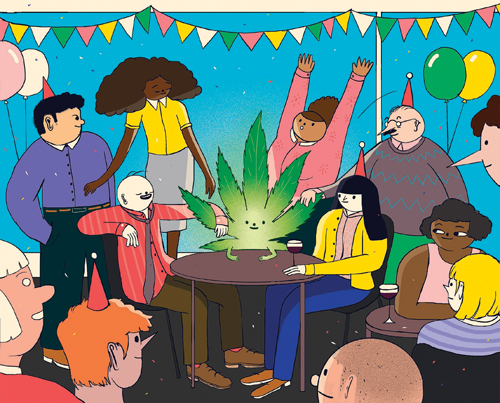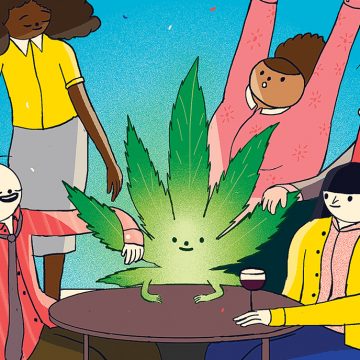On a muggy July afternoon in Toronto’s Financial District, a mob of buttoned-down 20- and 30-somethings crowds around the bar at Assembly Chef’s Hall. They order beers and cocktails before racing to score a spot on the patio. It’s a familiar Friday ritual, except for the section of the bar that’s topped with lighters, pipes, vaporizers and sleek brochures titled “Higher Learning,” which define a glossary of terms — THC, sativa, kush — that were once familiar only to stoners. A plate of brownies sits next to the paraphernalia. The treats don’t have cannabis in them. At least, not yet.
That area of the bar is operated by Tokyo Smoke. Come October 17, this nationwide chain of coffee shops will start selling legal weed in every province that permits private pot sales. (Ontario will be one of them.) The company is betting that it can turn today’s after-work drinks into tomorrow’s after-work smoke sessions.
It won’t be easy. In an April 2018 Statistics Canada report, only 14 percent of Canadians said they had used cannabis in the past three months; only six percent said they would either increase their consumption or try the drug for the first time. To win over lawyers, bankers and other professionals, Tokyo Smoke will need to replace the stereotype of the lazy stoner with a new, more elegant vision of what it means to consume cannabis.
The first strategy is to create a posh weed culture. “We want retail environments that urban professionals feel comfortable walking into,” says Will Stewart, vice-president of communications at Tokyo Smoke’s parent company, Hiku. “Instead of a plastic neon-green bong with a big pot leaf on it, we sell beautiful porcelain bongs that could be vases in your living room.”
No matter their decor, cannabis companies will struggle to convince the masses to embrace the physical act of smoking. “When people think of cannabis, they think of someone smoking a joint,” says Mark Zekulin, the president and CEO of Canopy Growth, one of Canada’s largest cannabis companies (it signed an agreement to acquire Hiku in July). “And as a society, we are generally moving away from smoking.”
Edibles and cannabis-infused drinks, however, don’t carry the same stigma. “It’s still going to be a long time before corporate events offer edibles,” says Stewart. “But it won’t be long before lawyers hosting a dinner party offer beer, wine and an infused beverage or edible for dessert.”
 In the legal profession, the stigma around cannabis has started to recede. When Rami Chalabi, an associate at Bennett Jones LLP, started to represent cannabis companies three years ago — advising them on mergers, acquisitions and initial public offerings — it was relegated to the fringes. “We kept it a little quiet,” he says. “Now, it’s one of the largest parts of our practice.”
In the legal profession, the stigma around cannabis has started to recede. When Rami Chalabi, an associate at Bennett Jones LLP, started to represent cannabis companies three years ago — advising them on mergers, acquisitions and initial public offerings — it was relegated to the fringes. “We kept it a little quiet,” he says. “Now, it’s one of the largest parts of our practice.”
Though cannabis has become a legit practice area, lawyers are hesitant to admit they’re users. “Legal culture is predicated on being on your game and sharp,” says Chalabi. “That’s not something you associate with cannabis.”
Zekulin is convinced lawyers will become more comfortable with cannabis, but knows it will take time. “You’ve had decades and decades where it was illegal, and people don’t talk about things they do that are illegal,” he says. “That stigma will not just disappear because the law has changed.”
This story is from our Fall 2018 Issue.
Illustration by Dalbert Vilarino


